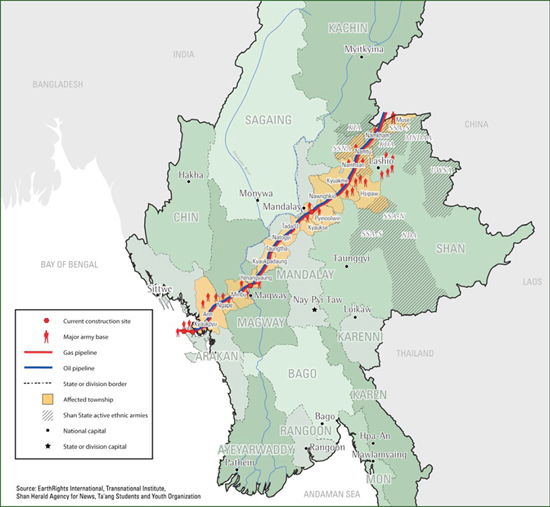Probably in response to scathing criticisms form its opponents, government authorities have started paying compensations to villagers in Shan State on whose land the pipelines will be passing through, according to sources from Namkham, the Shan State’s northernmost township.
Some 86 households in 9 villages have already received payments for the loss of their land and livelihood:
Wiang Kang 4 households
Man Mai 3 households
Namma 12 households
Hopoong 20 households
Loikang 2 households
Nawngtern 5 households
Nawng Ma 3 households
Nawng Kham 29 households
Namkham 8 households
Payments are being made in 3 categories: “Close to the town, some distance from the town and far from the town,” according to a recipient:
Clost to the town K 13,500,000 ($ 18,000) per acre
Some distance from the town K 10,000,000 ($ 13,333) per acre
Far from the town K 6,000,000 ($ 8,000) per acre
Farmers so far have received only 50% of the total due. “It is not known when the balance will be paid,” he said.
Pipes going through a former paddy field between Namtu and Namkham
Meanwhile, villagers from Nawng Kham say their neighbors in Nongdao (Nawng Tao) across the border are getting Ұ 50,000 ($ 8,333) per mu (0.2 acre) plus substitute land to work on. “Which means the Chinese government is taking care of their people more than the Burmese government is for us,” a villager there said. “Moreover, there is also awareness campaign run by the local government to explain to the people about the pipelines and how they could affect their lives. But we, on this side of the border, is getting none of it.”
Earlier, authorities did not mention anything about compensations. “We can take any piece of land away from you at anytime,” a villager in Hsipaw, further south, quoted a Burmese officer as saying.
According to Article 37 of the 2008 constitution, ownership of all natural resources, including land, is vested in the government.
According to March 2011 Earth Rights International (ERI) report, 18 townships in Burma will be affected by the pipelines coming from Arakan State’s Kyauk Phyu through Magway, Mandalay and Shan State into China. In Shan State alone, affected townships include Nawngkhio, Kyaukme, Hsipaw, Namhsan, Namtu, Namkham and Muse.



